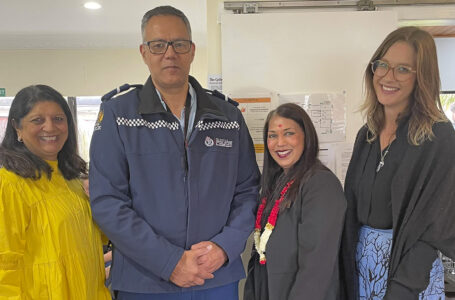
Zonta East Auckland is part of a Zonta International campaign Zonta Says No to gender-based violence. Locally, Zonta has undertaken to have a conversation with key people from the White Ribbon campaign, Ghandi Nivas, Woven Earth, Women’s Refuge and Shine. This is part 3
Let us Say Yes! – to acknowledging the work people are doing to make a difference to moving beyond just Saying No to violence.
Zonta East president Ruby Govender visited Gandhi Nivas at the same time that Ranjna Patel was also hosting American visitors (Ruby’s Place).
They had come to witness New Zealand’s unique approach in supporting the perpetrators of domestic violence, which ultimately benefitted the victims.
President Ruby reported “that offering support and rehabilitation to individuals involved in domestic violence proves to be a more effective strategy for enhancing the long-term well-being of the victims”.
Gandhi Nivas’s primary mission is to restore hope and empower change, with a focus on preventing family harm in New Zealand.
Providing early intervention services to men, aimed at preventing family harm, their innovative approach involves a programme that encourages men, rather than their victims, to leave the family home and seek help.
Originally targeted at the Indian and Fijian Indian community in South Auckland, where alarmingly high rates of family violence had been identified by police, today, Gandhi Nivas is now a collaborative effort involving Auckland’s Serenity Foundation, Total Healthcare PHO, NZ Police, and Sahaayta Counselling and Social Support.
They provide free counselling, emergency housing, and referrals to social services for men and their whānau who have been issued a “Police Safety Order” or have otherwise been involved in police matters related to family harm.
Offering early intervention and prevention services for New Zealand men identified as being at risk of committing harm within the family home, Gandhi Nivas supports men in changing their behaviour.
Ruby reports that “by giving the men tools in their kete, this reduces the likelihood of further family harm while enhancing the safety of their families”.
The primary objective is to help offenders take a positive role in preventing violence against women by educating each offender about the consequences of their actions, urging them to take responsibility and facilitating their access to support to change their behaviour.
The results of a study conducted by Massey University from 2015 to 2019, presented at Parliament in July 2020, found that by working directly with perpetrators and their whānau, Gandhi Nivas was able to prevent almost 60 per cent of the participating men from reoffending.










